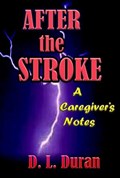Nothing rocks your world as profoundly as a severe stroke. No one is prepared for its traumatic aftermath. Least of all, a loving spouse taking on the role of caregiver. In the U.S. approximately 795,000 people per year have a stroke. Of that number, nearly 130,000 die. Of those that survive, many are left with long-term disabilities, which was the case with author Dora Duran's husband, Robert.
The day that changed their lives occurred in the morning. When her husband collapsed onto the front room floor and couldn't get up, Ms. Duran dashed to the phone and dialed 911. Thus, the nightmare began. From the Emergency Room, to admission to ICU, After the Stroke gives a chilling account of Robert's worsening condition in the intense hospital setting. A few days after his stroke, he slips into a semi-comatose state.
What happens next confirms the importance of familial support in a stroke patient's battle for life. The author also affirms the power of prayer when physical strength weakens and institutions fail.
After the Stroke describes the enormous changes that caregivers and their families must make to accommodate the physical needs of a newly handicapped stroke survivor: Alterations to living quarters. No more rugs. Wood floors for wheelchairs. Ramps instead of stairs. Diet restrictions. Ongoing physical therapies. It addresses the difficulties of dealing with the medical establishment, including the indifference of some doctors, short-staffed nursing departments that haven't the capacity to meet the needs of critically ill patients. The book reports the common practice of hospitals pushing patients into nursing homes because they don't meet Medicare's benchmarks. Finally, it deplores the devastating costs of hospitalization and rehabilitation on a senior couple's limited budget, even with Medicare and VA coverage.
While numerous books promise miracle cures, this one does not sugarcoat the truth about the difficulties faced by many stroke survivors, their caregivers and families. However, it does highlight methods of overcoming limitations and making life enjoyable for both stroke survivor and caregiver. Life is the precious reward.

